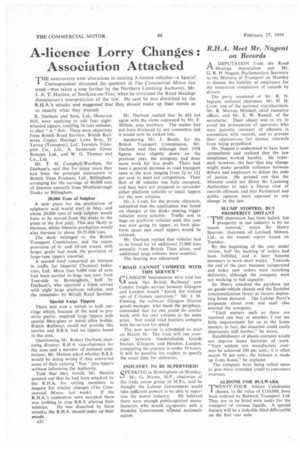A-licence Lorry Changes : Association Attacked
Page 34

If you've noticed an error in this article please click here to report it so we can fix it.
THE controversy over alterations to existing A-licence vehicles—a Special I Correspondent discussed the question in The Commercial Motor last week—was taken a step further by the Northern Licensing Authority, Mr. J. A. T. Hanlon, at Stockton-on-Tees, when he criticized the Road Haulage Association's interpretation of the law. He said he was disturbed by the R.H.A.'s attacks and suggested that they should make up their minds as to exactly what they wanted.
R. Durham and Sons, Ltd:, Haverton Hill, were applying to add four eightwheeled tippers, totalling 34 tons unladen, to their " A" fleet. There were objections from British Road Services, British Railways, Copley Haulage, Lowe Bros., D. 7arren (Transport), Ltd., Teesdale Transport Co., Ltd., A. Sanderson (Great Britain), Ltd., and W. G. Thomas and Co., Ltd.
Mr. T. H. Campbell-Wardlaw, for Durham's, said that for many years they had been the principal contractors to British Titan Products, Ltd., Billingham, arranging for the carriage of 40.000 tons of ilmenite annually from Middlesbrough Docks to Billingham.
20,000 Tons of Sulphur
A new plant for the production of sulphuric acid would start in May, and about 20,000 tons of bulk 'sulphur would have to be moved from the docks to the plant in the first year. This was likely to increase, whilst ilmenite production would also increase to about 50-55,000 tons.
The dock belonged to the British Transport Commission, and the recent provision of 6and 10-ton cranes with larger grabs had made the provision of large-type tippers essential. • A second need concerned an increase in traffic for Imperial Chemical Industries, Ltd. More than 9.000 tons of urea had been carried in bags last year from Tees-side to Birmingham, half by Durham's, who operated a trunk service with eight large platform vehicles, and the remainder by British Road Services.
Special Large Tippers There was now a switch to bulk carriage which, because of the need to preserve purity, required large tippers with special fibre-glass or metal alloy bodies. British Railways could not provide this service and B.R.S. had no tippers based in the area. •
Questioning Mr. Robert Durham; managing director, R.H.A. vice-chairman for the area and a member of national committees, Mr. Hanlon asked whether B.R.S. would be doing wrong if they converted some of their existing " flats " into tippers without informing the Authority.
Told that they would, Mr. Hanlon pointed out that he had been attacked by the R.H.A. for calling members to inquiry for similar changes (The Com mercial Motor, last week). If the R.H.A.'s contention were accepted there was nothing to stop B.R.S. altering their vehicles. He was disturbed by these attacks; the R.H.A. should make up their minds.
A32 Mr. Durham replied that he did not agree with the views expressed by Mr. F. Milton. area secretary. The matter had not been discussed by any committee and it would now be looked into.
Answering Mr. J. Booth, for the British Transport Commission, Mr. Durham said that although their 1958 figures were slightly down on the previous year, the company had done more work for less profit. There had been a general decrease in road transport rates in the area ranging from 2-1 to 12+ per cent. to meet rail competition. Their fleet of 48 vehicles was fully occupied, and they were not prepared to surrender either platform vehicles or small tippers for the new vehicles.
Mr. .1. Croft, for the private objectors, submitted that the application was based on changes at the docks making bigger vehicles more suitable. Traffic sent in bags on platform vehicles until this year was now going by tipper, so both platform space and small tippers would be released, Mr. Durham replied that vehicles had to be found for an additional 35,000 tons annually from British Titan alone, and additional large vehicles were essential.
The hearing was adjourned.
"ROAD CANNOT COMPETE WITH THIS SERVICE"
GLASGOW businessmen were told last week that British Railways' new Condor freight service between Glasgow and London would "knock the bottom out of C-licence operation." Mr. J. M. Fleming, the railways' Glasgow District goods manager, who made the prophecy, contended that no one could do similar work with his own vehicles at the same price. Nor could road hauliers compete with the service for speed.
The new service is scheduled to start on March 16. The train will run overnight between Gushetsfaulds Goods Station, Glasgow, and Hendon, London, completing the journey in under 10 hours. It will be possible for traders to specify the exact time for deliveries.
INDUSTRY TO BE SUPERVISED?
SPEAK1NG in Birmingham on Monday, Mr. G. Brown, M.P., chairman of the trade union group of M.P.s, said he thought the Labour Government could take sufficient powers to be able to super vise the motor industry. He believed there were enough public-spirited manufacturers who would co.-operate with a Socialist Government without nationalization.




































































































